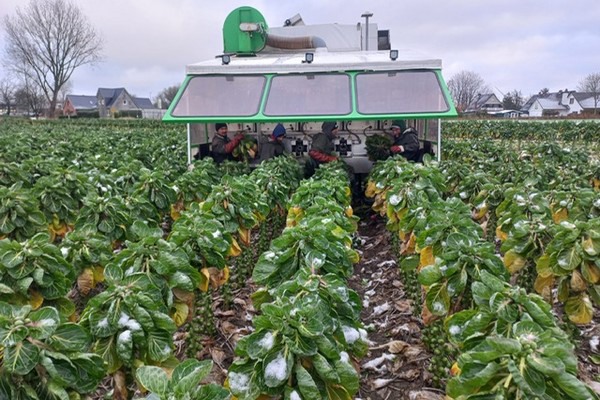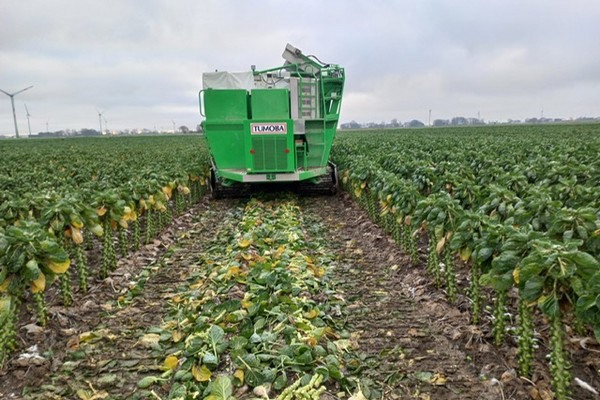At the beginning of what is traditionally the strongest sales month, Brussels sprout growers are taking stock. "In view of the difficult growing year with persistent drought and limited irrigation possibilities, I am satisfied for now. I would have thought it would be a complete disaster, but then came the pleasant autumn, which helped us. So, all in all, we have quality goods, although the calibers could still be a bit bigger," says Brussels sprout producer Eric Müller from Dithmarschen, summarizing the situation so far.

The Brussels sprout harvest at the Helse farm.
"In this respect, we are quite optimistic about the next few days," continues the owner of Hof Helse Ltd. One decisive factor this year will be the weather situation in the weeks before Christmas, in particular how much frost the northern German fields will receive.
Müller: "At the start of the season in September, yields were somewhat lower, which was reflected in a nice pricing. Marketing then stalled somewhat at the end of October, as there was hardly any action for about three weeks. November sales are traditionally a bit slower and this year was no different. In December, the question is how Brussels sprouts will compare in price to other vegetables on the shelves, such as cauliflower and broccoli. Broccoli, for example, has the advantage that it requires little effort in the kitchen, unlike Brussels sprouts."

Dithmarscher Brussels sprouts are usually sold by late January to mid-February. In Germany, the large-caliber (B-caliber) product in particular is well received.
Vegetable farmers in the cabbage stronghold of Dithmarschen also face exponentially increased costs. "We need a relatively large amount of electricity in our region. At the same time, the increase in inflation and the increased energy costs are also hitting the consumer, which is why, all in all, you have less money in your pocket. In a nutshell: It is difficult for us farmers to pass on the additional costs. Because we have to face the supply and demand on the market and ultimately the cheapest sells," Müller points out.
According to Müller, the adversity has led to an increased focus on price entry. "I suspect that sales will remain stable in the discounter and decline in the other retail chains. Here and there you can already observe that a little bit, in which the sales rates at the discounter are more constant."
Disproportionate risk in cultivation
Not only in the current campaign, but also from a longer-term perspective, the work of domestic vegetable growers is underappreciated. "In my opinion, the disproportionate risk of northern German open ground production is not rewarded enough. On average, once every five years a substantial part of the winter yield freezes up, which means considerable financial losses. Also, retail chains are in a luxury position, always being able to draw from surpluses. That may change in the future, due to changes in the cost structures."
Images: Hof Helse Ltd.
For more information:
Eric Müller
Hof Helse GmbH
Alte Landstraße 1
25709 Helse, Deutschland
Tel.: +49 4851 93893
hofhelse@rosenkohl.de
